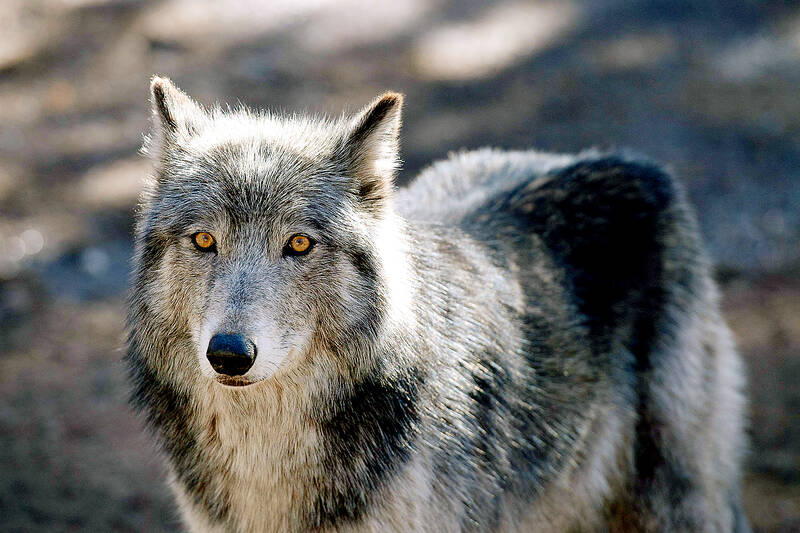Like dogs, wolves recognize and respond to the voices of familiar humans more than strangers, says a study that has implications for the story of canine domestication and the broader understanding of the natural world.
Holly Root-Gutteridge, a postdoctoral research fellow of the University of Lincoln and coauthor of the paper that appeared in Animal Cognition this week, said a longstanding theory held that dogs’ ability to distinguish human voices was a consequence of generations of selective breeding.
“So we wanted to look at wolves, because obviously nobody has been selecting so that wolves can recognize human voices,” she said.

Photo: AFP
Root-Gutteridge and colleagues carried out experiments across five zoos and wildlife parks in Spain, involving 24 gray wolves, both male and female, aged from one to 13.
The team set up speakers and first played the animals the voice of a number of strangers that they would “habituate” to, in other words, get bored of, because they decided it was not salient to them.
Then, they played the wolves the voice of their keeper who would say familiar things to them in Spanish, such as “Hey, what’s up wolves?” or “Hello little ones, good morning, how’s it going?”
In gestures that would be instantly recognizable to any dog owner, the wolves raised their heads, pricked their ears up, and turned toward the speaker.
To test the effect was not random, the researchers went back to playing the wolves recordings of strangers, and found they once more lost interest.
Finally, to make sure the wolves genuinely knew their keepers’ voices, rather than just knowing words that the familiar humans would normally say to them, the team mixed things up and had the keepers utter a stream of unfamiliar phrases. Once more the results held up.
That the wolves engaged with disembodied voices played through speakers echoes what has been seen in dogs from the era of gramophones — as captured in a famous painting titled His Master’s Voice — to today’s video doorbells, although it is not yet known whether our pooches enjoy this or it frustrates them.
In terms of implications, Root-Gutteridge said it was significant that wolves possessed the ability to distinguish between humans despite wolves and humans going separate evolutionary ways tens of millions of years ago.
Before this, there had been limited study on the topic of how animals differentiate between the vocalizations of other species. Research had shown our close cousins, gorillas listen to people, but that was expected. Big-brained elephants have also been found to distinguish the gender, age and ethnicity of humans by their voices, assigning less threat value, for example, to women and children, in addition to being more fearful of the elephant-spearing Maasai than the agrarian Kamba.
Given the new finding, “chances are, lots of species are listening to us and getting to know us as individuals,” Root-Gutteridge said.
It is not all about us, she said.
Dogs could be listening to the neighbors’ cats and understanding the difference between one meow or the other, for example.
“If the abilities are that general, it means that animals might be having a lot more cross species interactions than we had thought about before,” she said.

A French-Algerian man went on trial in France on Monday for burning to death his wife in 2021, a case that shocked the public and sparked heavy criticism of police for failing to take adequate measures to protect her. Mounir Boutaa, now 48, stalked his Algerian-born wife Chahinez Daoud following their separation, and even bought a van he parked outside her house near Bordeaux in southwestern France, which he used to watch her without being detected. On May 4, 2021, he attacked her in the street, shot her in both legs, poured gasoline on her and set her on fire. A neighbor hearing

DEATH CONSTANTLY LOOMING: Decades of detention took a major toll on Iwao Hakamada’s mental health, his lawyers describing him as ‘living in a world of fantasy’ A Japanese man wrongly convicted of murder who was the world’s longest-serving death row inmate has been awarded US$1.44 million in compensation, an official said yesterday. The payout represents ¥12,500 (US$83) for each day of the more than four decades that Iwao Hakamada spent in detention, most of it on death row when each day could have been his last. It is a record for compensation of this kind, Japanese media said. The former boxer, now 89, was exonerated last year of a 1966 quadruple murder after a tireless campaign by his sister and others. The case sparked scrutiny of the justice system in

DITCH TACTICS: Kenyan officers were on their way to rescue Haitian police stuck in a ditch suspected to have been deliberately dug by Haitian gang members A Kenyan policeman deployed in Haiti has gone missing after violent gangs attacked a group of officers on a rescue mission, a UN-backed multinational security mission said in a statement yesterday. The Kenyan officers on Tuesday were on their way to rescue Haitian police stuck in a ditch “suspected to have been deliberately dug by gangs,” the statement said, adding that “specialized teams have been deployed” to search for the missing officer. Local media outlets in Haiti reported that the officer had been killed and videos of a lifeless man clothed in Kenyan uniform were shared on social media. Gang violence has left

US Vice President J.D. Vance on Friday accused Denmark of not having done enough to protect Greenland, when he visited the strategically placed and resource-rich Danish territory coveted by US President Donald Trump. Vance made his comment during a trip to the Pituffik Space Base in northwestern Greenland, a visit viewed by Copenhagen and Nuuk as a provocation. “Our message to Denmark is very simple: You have not done a good job by the people of Greenland,” Vance told a news conference. “You have under-invested in the people of Greenland, and you have under-invested in the security architecture of this